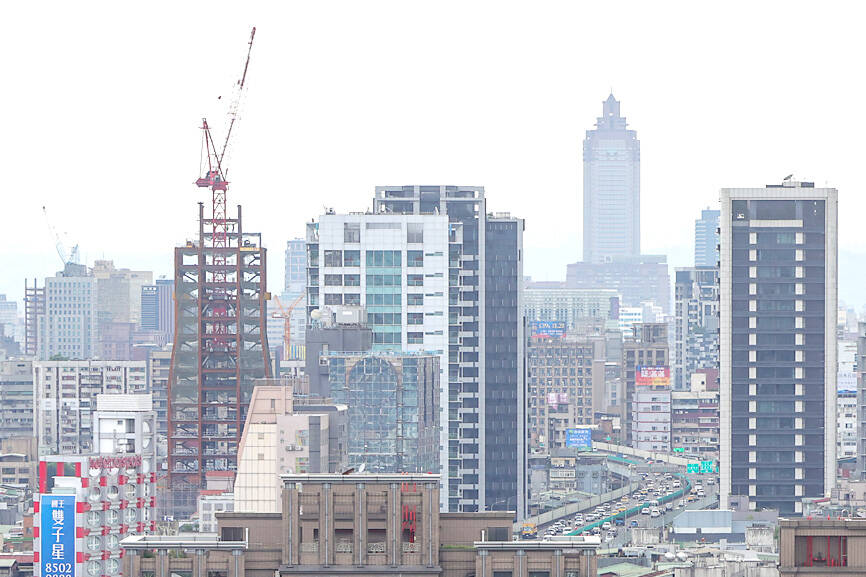Property transactions in the six special municipalities climbed to 23,413 units last month, rising by double-digit percentage points from a year earlier, as preferential interest rates spurred buying among people with real demand and storefronts showed an uptick, brokers said yesterday.
The pickup was broad-based, but most evident in southern Taiwan, where fence-sitters took action to close deals, Great Home Realty Co (大家房屋) research head Mandy Lang (郎美囡) said.
Transactions in Tainan and Kaohsiung jumped 18.3 percent from one month earlier to 3,198 and 3,502 units respectively, helped by new house deliveries and first-home purchases, Lang said.

Photo: CNA
The pace of gains, at 98.6 percent in Tainan and 29.3 percent in Kaohsiung, was much stronger compared with a year earlier, as the two southern cities benefitted from high-tech firms’ capacity expansions, the analyst added.
Property deals expanded 15.5 percent to 4,299 units in Taichung and rose 14.7 percent to 3,931 units in Taoyuan, local government agencies said on their Web site, as improving infrastructure and relatively affordability continued to lend support.
Transactions in Taipei advanced 8.1 percent from one month earlier and edged up 1.5 percent in New Taipei City, local statistics showed.
The introduction of preferential rates for first-home purchases by the Cabinet played a key role in facilitating the sentiment change, Lang said, adding that the central bank’s decision to keep interest rates unchanged in June and September also helped.
The central bank is due to review its policy rates in two weeks after leaving room in September for renewed tightening to curb inflation if necessary. Consumer prices climbed above the 3 percent mark in October, but might return to the central bank’s 2 percent target next year.
H&B Realty Co (住商不動產) chief researcher Jessica Hsu (徐佳馨) said she observed a pickup in buying interest for small storefronts and office spaces, as they can generate stable and regular rent income, but do not require large capital.
Such objects have become bright spots for individual buyers as companies need to obtain government approval before going through the deals, Hsu said.

South Korea’s equity benchmark yesterday crossed a new milestone just a month after surpassing the once-unthinkable 5,000 mark as surging global memory demand powers the country’s biggest chipmakers. The KOSPI advanced as much as 2.6 percent to a record 6,123, with Samsung Electronics Co and SK Hynix Inc each gaining more than 2 percent. With the benchmark now up 45 percent this year, South Korea’s stock market capitalization has also moved past France’s, following last month’s overtaking of Germany’s. Long overlooked by foreign funds, despite being undervalued, South Korean stocks have now emerged as clear winners in the global market. The so-called “artificial intelligence

‘SEISMIC SHIFT’: The researcher forecast there would be about 1.1 billion mobile shipments this year, down from 1.26 billion the prior year and erasing years of gains The global smartphone market is expected to contract 12.9 percent this year due to the unprecedented memorychip shortage, marking “a crisis like no other,” researcher International Data Corp (IDC) said. The new forecast, a dramatic revision down from earlier estimates, gives the latest accounting of the ongoing memory crunch that is affecting every corner of the electronics industry. The demand for advanced memory to power artificial intelligence (AI) tasks has drained global supply until well into next year and jeopardizes the business model of many smartphone makers. IDC forecast about 1.1 billion mobile shipments this year, down from 1.26 billion the prior

Chinese artificial intelligence (AI) start-up DeepSeek’s (深度求索) latest AI model, set to be released as soon as next week, was trained on Nvidia Corp’s most advanced AI chip, the Blackwell, a senior official of US President Donald Trump’s administration said on Monday, in what could represent a violation of US export controls. The US believes DeepSeek will remove the technical indicators that might reveal its use of American AI chips, the official said, adding that the Blackwells are likely clustered at its data center in Inner Mongolia, an autonomous region of China. The person declined to say how the US government received

People stand in a Pokemon store in Tokyo on Thursday. One of the world highest-grossing franchises is celebrated its 30th anniversary yesterday.